#greek mythology meta
Text
i keep thinking about the odyssey i am THINKING about wei wuxian as odysseus. you were dead. its been years since you’ve seen your family. the child you left behind is almost a man. you wear a face they don’t recognise, you sneak in through the back door. the dog gives your identity away. the world knows it’s you when you draw your weapon. the person you love recognises you by the original symbol of your love—a secret that no one else in the world knows about, still, because they kept it safe for all these years. you get the chance to go back and despite everything, you found home waiting for you; he kept your place and raised your son and he was still there waiting for you when you got back. tell me o muse, about a complicated man i am extremely not okay
#cql#mdzs#wangxian#wwx#lwj#meta stuff#greek mythology#i am not fine i am not sane in the slightest#no idea if i’ve posted something similar to this before#i definitely started my odyssey journey thinking about them but then i got sidetracked with. the actual odyssey#i have been on an absolute greek tragedy bender though so there’s. plenty more to come. but also. HHHHH#the dog thing is so silly but i couldn’t help keeping it in because that is SO funny#this is soooo self indulgent i am sorry for subjecting u all to this#thank u to helendamnation my beloved for listening to all my rambling this weekend about this#jesus. home waited. the odyssey is about many things but it is about a man coming home.#and despite everything. he gets to come home. and he gets it because his home waited for him.#despite him being dead. despite the gods. despite the suitors and the pressure and the doubt.#in most stories home moves on without you but this time. this one time. home waited.#homeric hyperfixation haze
2K notes
·
View notes
Photo
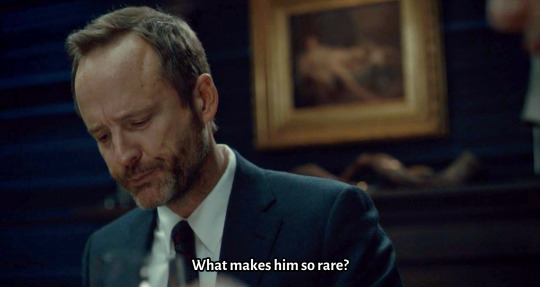
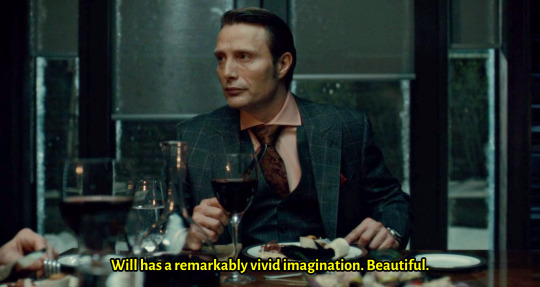


“The gods envy us. They envy us because we’re mortal, because any moment might be our last. Everything is more beautiful, because we are doomed. You will never be lovelier than you are now, We will never be here again.” - Achilles (Troy)
#Achilles#Troy#hannigram#hannibal meta#hannibal x will#hannibal lecter#hannibal#will graham#dr. sutcliffe#murder husbands#Buffet Froid#The Wrath of the Lamb#nbc hannibal#hannibal nbc#quotes#meta#greek mythology
3K notes
·
View notes
Text
I could talk for days about the costuming in the show, and I probably will. One of the small details I’d like to point out is Persephone’s hair. It’s easy to point and talk about her change from vibrant greens to dressing like she is headed for a funeral but I think her hair speaks volumes (ha)
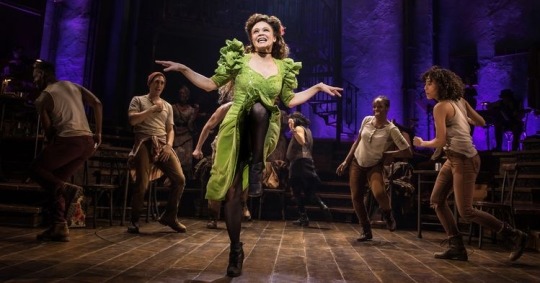
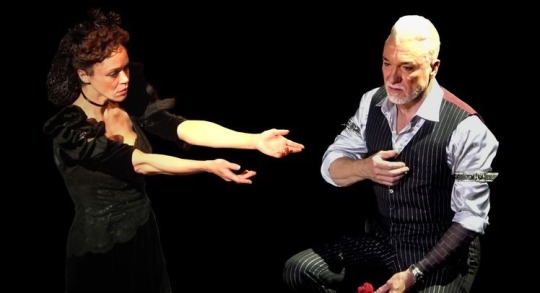
Up top Persephone let’s herself loose. She’s dancing and moving- hell! She floats from person to person absolutely buzzing with excitement as everyone in the bar is so alive - literally! She’s loose and very telling with her body language. Her hair is down and wild as she is. She has a nice bit of flowers braided in too.
Down below she’s stiff. It’s like her clothes confine her just as much as the town and hades himself does. She still moves and has expression but she’ll toss her wrist instead of something full body. She gestures , she stands and she walks instead of floating. Here her hair is put into a snood, her hair is caged. All that wild energy is subdued, even the little flowers on it are black and dead (likely as apart of the snood and not real flowers but the point stands).
I just— this show has so much loving detail put into it down to the floors and the smallest fiber oh costumes and I’m so in love.
#hadestown#hadestown broadway#hadestown musical#Persephone#persephone hadestown#hades and persephone#character study#costume appreciation#costume analysis#meta#greek mythology#small details
918 notes
·
View notes
Text
On love and sacrifices
There’s so much more to this scapegoating business and big sacrifices referenced in the Good Omens narrative than the literal goats. And they’re only getting bigger, louder, final.
But let’s take it slow and start with the beginning, quite literally — i.e., with the Good Omens 2 title sequence. As we follow Aziraphale and Crowley on their journey, the universe warps and their usual left and right side positioning switches during the magic show (not accidentally an act of trust and sacrifice required both from the angel and the demon). They stay so throughout the next scene, which is their little dance in the air, and after they seemingly get settled on the A. Z. Fell and Co.’s roof and back to normal, the flipped sky in the background suggests that something’s not quite right yet. In the central part of the shot looms a large, humanlike shadow of the Elephant Trunk Nebula.

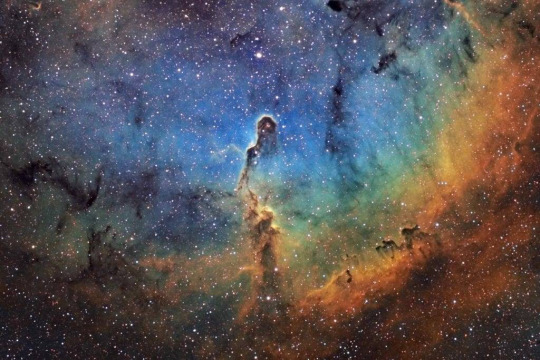
The nebula is a part of a constellation called Cepheus, after an Ethiopian king from the Greek mythology who agreed to sacrifice his only daughter in order to appease the gods and end a local calamity started by her mother and his wife, Cassiopeia (talk about generational responsibility). With time and a delightfully ironic twist of fate, the name of said daughter, Andromeda, became more famous than that of her father. Although she was chained up to a rock and offered to the sea serpent Cetus, the girl was spotted by the warrior Perseus, casually flying over the sea — either on the back of the Pegasus or thanks to a pair of winged sandals — after his victory over Medusa. He fell in love on the spot, defeated the serpent (with the help of a magical sword or Medusa’s severed head, depending on the varying sources), and freed the princess. That’s not exactly where their story ends, but we won’t be getting into the rest here.
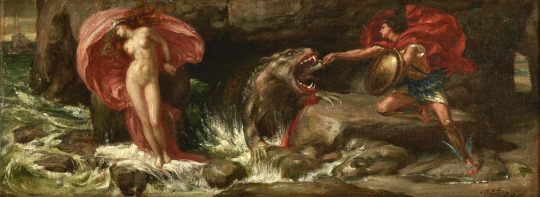
Not surprisingly, Neil has mentioned two parallel child sacrifice stories from the biblical context back in August. The first is one of the big ones — The Binding of Isaac. God's command to sacrifice Isaac, his only son, was a test of Abraham's faith. The angel of the Lord intervenes and provides a ram to be sacrificed in the boy’s place.
The second one isn’t nearly as popular, but you might have heard a variant of it in fairy tales or as the Law of Surprise invoked in The Witcher saga. In exchange for Israel’s victory over its enemies in battle, Jephthah had rashly promised God to repay the debt with the first thing seen on his return back home. The victorious warrior didn’t suspect to see his only child moving innocently "to meet him with timbrels and with dances" though. In horror, Jephthah covered his eyes with his cloak, but to no avail: ultimately, he was forced to honor his vow to God, and the girl was sacrificed. As grisly as it might look like in the Old Master’s paintings, it’s important to remember that human sacrifices weren’t limited to physical offerings only — Jephthah’s daughter might have been offered to God in the sense of officially shunning her family and dedicating her life to service instead, probably sequestered in a temple somewhere.
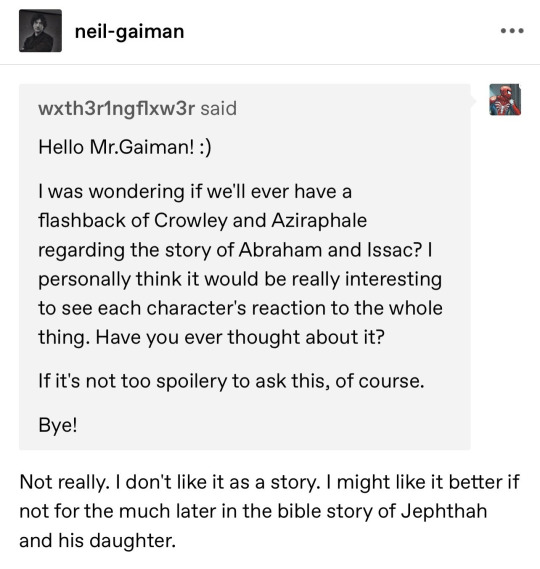
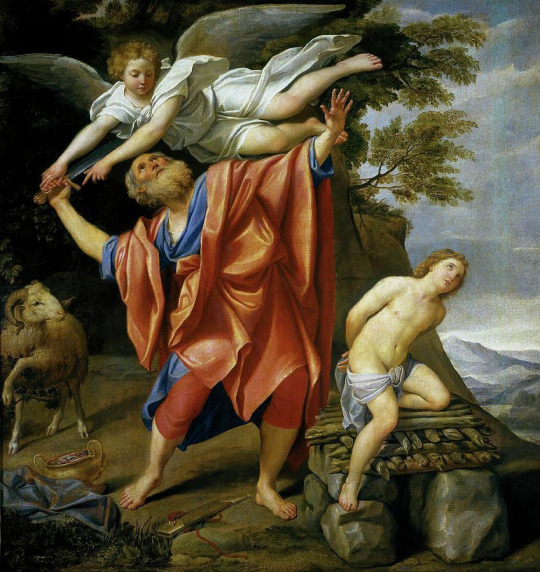
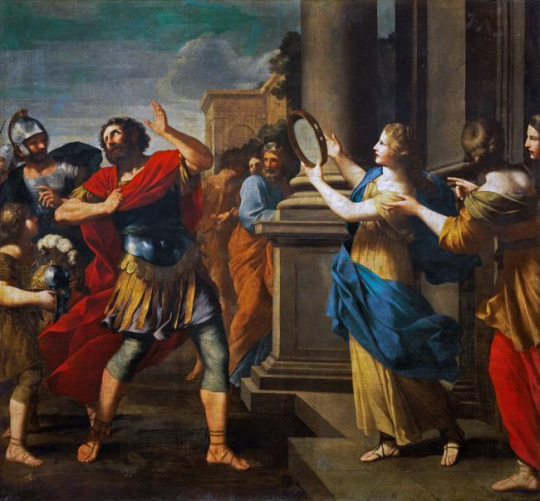
Interestingly, the main character of a big chunk of the Bible and the reason for the Second Coming happens to be THE most influential child sacrifice in the modern history. You know, a certain 33-year-old carpenter sent by his Heavenly Father to die on a cross for the sins of the mankind? Someone better call Aubrey Thyme ASAP.
Circling back to Aziraphale, he could be also seen as a representative of the concept of filial piety, since Eden willing to personally take a Fall not only for the humanity’s collective or individual transgressions, but the shortcomings of his Ineffable Parental Figure as well. Our favorite angel angel always fights for what is right and good, sure, but why would that be even a thing if God was truly omniscient, omnipresent, and omnipotent?
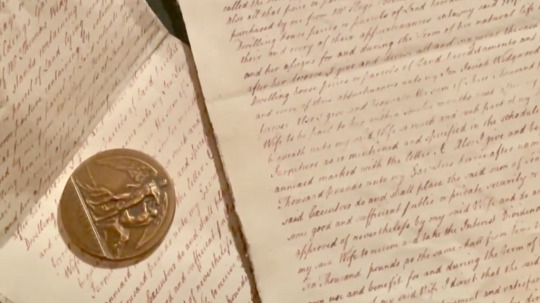

If Aziraphale’s medal is anything to go by, it looks like we might get an answer from the way it’s introducing another mythological narrative into the game, that is the story of Daedalus and Icarus. The most absorbing thing about this is the stark contrast to the recurring child sacrifice references for S3 mentioned in this post — Daedalus isn’t a father who wanted to sacrifice his son, it was his attempt to save him from imprisonment that ultimately drove Icarus to his death. The boy ignored his father’s explicit instructions, committing the grave and culturally universal sin of disobedience to one's parents that simply couldn’t go unpunished, one way or another.
But Icarus’s transgression could be seen both as high-flying ambition and striving for personal accomplishment as well as humanitarian sacrifice for knowledge and humanity’s advancement in general.
Similarly to a certain angel who left everything for what superficially seems like a work promotion, but is the ultimate act of love — both for his demon and the children they have been protecting and nurturing together for six thousand years. From the very Beginning, his white wings have been shielding everything he holds dear in this world.
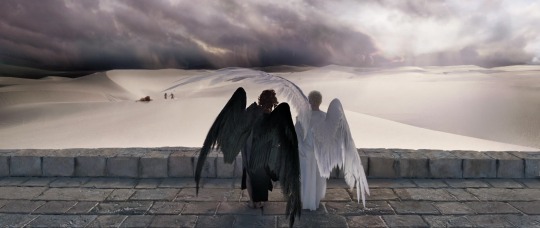
#happy easter#child sacrifice#greek mythology#bible fanfiction#good omens#good omens meta#never skip the intro#peter anderson studio#easter eggs#nebula#archangel michael approves#sword fighting with snakes#prince and the serpent#supreme archangel aziraphale#bamf aziraphale#aziraphale needs a hug#aziraphale#crowley#yuri is doing her thing#daedalus and icarus#cepheus and andromeda#abraham and isaac#jephthah’s daughter#god and jesus
142 notes
·
View notes
Text
Not to get pedantic (oh who am i kidding that’s most of this blog) but I am genuinely fascinated by the potential applications of the established canon in HoO and TOA that the gods canonically have both historic and regional forms, and can appear as specific versions of those forms and have kids of those specific forms, which influence what powers the kid has/what pantheon they fall under/etc etc (and also the implication that demigods can be born under multiple forms of a singular deity). This is somewhat backed up even earlier in the first series when we’re told that Percy has earthquake powers because of his father being Poseidon “The Earthshaker” (which is Mycenaean Poseidon) - which could also tie into why Percy generally takes leadership roles, is hopping in and out of the Underworld a lot, and is apparently particularly powerful for even just a Big 3 kid, since all that would line up with Mycenaean Poseidon being generally put at the head of the pantheon and also being a chthonic deity.
Now this gets really interesting when we start looking at deities being combined and conflated, because a.) the Romans weren’t the only ones doing that and b.) the Romans had their own gods originally, they didn’t just take the Greek ones and slap a new name on them. They merged a lot with their own preexisting deities alongside adopting worship of deities from other cultures as the Romans spread (and the Greeks also did this), and c.) the ancient Greeks and Romans did exist at the same time.
Like, we know in terms of the Greeks and Romans that if their godly parents are “equivalent” then their demigod children are siblings, just like if Greek demigods have the “same” godly parent then they are also siblings. However, very few Greco-Roman gods are one-to-one, and a lot are like three gods in a trench coat, and then if you want to get into historical forms then you can start running into weird things like “Well, if you go back far enough, these two Greek gods may have originated from the same thing-” and also if we’re talking historical forms, again, the Greeks and Romans existed at the same time! Which means there would be historic forms of godly parents that are both Greek and Roman! So like, where do we go from there? Would Hazel be equally siblings to a child of Plutus as she is to Nico because both Hades and Plutus were conflated into Pluto? Orcus was also conflated with Pluto - does that mean when Nico killed Bryce Lawrence, he was killing his half-brother? (cause then that parallels just a couple chapters later when Will faces off against Octavian-) Are there demigods who, depending on their godly parents’ form(s), are technically both a Greek and Roman demigod? If Hermes and Pan possibly originated from the same god, does that mean all the satyrs are siblings with the Hermes kids? If we want to get into all the nonsense of Dionysus’ origins and Zagreus and Hades, does that mean Nico is technically siblings with Dionysus kids? Does Dionysus joke about this during their therapy sessions? Are some demigods in certain cabins siblings with kids in other cabins but each others’ siblings aren’t siblings depending on what form their godly parents were in?
I have a headache now.
#pjo#riordanverse#percy jackson#chb#camp halfblood#camp half-blood#camp jupiter#analysis#meta#Percy gets tagged for the fun random analysis interjection#listen i think too much about the worldbuilding and how it relates to historical mythology RICK YOU BROUGHT THIS UPON YOURSELF-#i hear ''yeah the gods can appear in historical and regional forms'' and i am already writing stuff about it you cant stop me#listen. there were city-states where the MAIN PANTHEON WAS TOTALLY DIFFERENT#i wanna hear about demigods whose parents are from a *different pantheon format* and how confused they get by the CHB format#also the potential humor of two demigods going ''well technically im your sibling but you're not my sibling'' ''what'' ''nevermind''#also how does deities adopting demigods play into this. how confusing does Jason's family tree get#is it different depending on what form(s) specifically he was adopted by?#also also also - you could totally argue based on linguistics and stuff that Nico 100% never lied to the Romans#(at least about being Greek vs Roman) but that can be a post for another time
429 notes
·
View notes
Text
I don't know if someone already said it but I need to make this post.
I read something about Orpheus not so long ago and my first thought was oh, this is STSG. The metaphor isn't perfect, the parallels don't completely align, but you can see it, the codes are here.
We all know the story. Eurydice died and Orpheus went to the deepest level of hell to bring her back, and the moment before he reached the surface, he turned around and lost her again forever.
Maybe it's just me, maybe it's because I'm too deep in the analysis of their relationship, but something in this myth resonates with Geto and Gojo's story.
They loved each other, no one can deny that. They were young and passionate, and they inspired each other to become better. Eurydice was Orpheus' muse and Suguru was Satoru's blue spring. Their lives were so bright and pretty and colorful when they were together.
Then one of them left, leaving the other in a state of despair. Unable to grieve, Satoru worked so hard to find a way to Suguru, to build a world where his love could come back (despite knowing very well that nothing could bring Suguru back to him).
Fast forward 10 years and so many things happened. Satoru still dreams of him.
Satoru knows about the Prison Realm, he knows this is a trap, he knows he can't stay here, he knows that if he stop moving he'd lose. He's smart, he knows. He also knows that Suguru's dead and there's no hope of saving him now. But when he hears the voice, he can't help but turn around, and he doomed himself (and the world) by doing that, but he has to -he needs to look back. To see Suguru's face, to be sure it's him. Orpheus knew it was Eurydice and Satoru knew it wasn't Suguru but they needed to be sure, they had to see by themselves. They knew they'd lose everything, and they did it anyway. Because when you hear the breath, the voice, the steps of the only one you have ever loved behind you, you look back.
And people keep accusing you for this ultimate mistake, they said you shouldn't have, they say they'd have acted differently, but it doesn't matter. Because if you acted differently, it would have meant that you didn't care about them.
Satoru turned back, and all the efforts he made to arrive here became vain.
This is a story doomed by love. Love is the twistest curse of all.
#yes I know i'm digging too much#i know i'm seeing things that aren't there#i know i'm making connection that doesn't need to be made#i know i know#but i'm heartbroken and i can't stop myself to think about them again and again#JJK is a story about love and love will be the end of all of them#they can't be saved because they can't stop themselves from loving. they're human. they will love even if it kills them.#they will love until it'll kill them.#okay imma stop the rambling now#geto suguru#gojo satoru#sugusato#stsg#gego#analysis#jjk meta#jujutsu kaisen#orpheus and eurydice#greek mythology#jjk
56 notes
·
View notes
Text
Knowledge in VNC : About Noé's eyes
So, we all remember that when Noé was very, very young he was injuried in one of his eye right ?
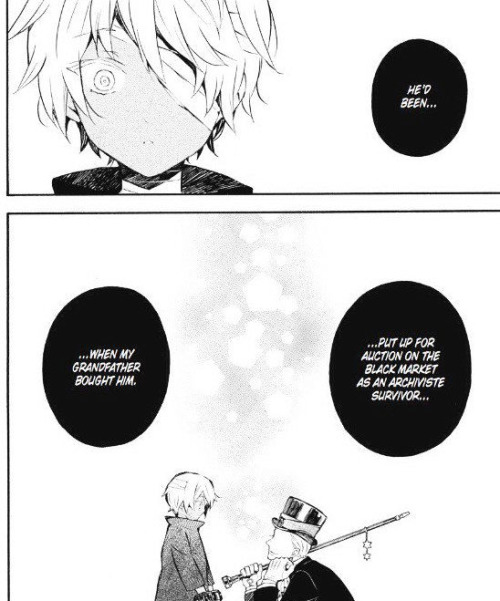
While people wonder why his left eye specifically, I might have the answer to this.
In latin, left is said "sinister" but in french it gave the word "sinistre" which means omnious and therefore lead to countless surpestition of left briging you infortune, on why you should never eat with your left hand, or that the wrong decision is always to choose the thing in the left etc. This comes from the Greek since Roman saw the left/sinister as a sign of good fortune and since VNC is full of latin/french reference it might be why.
Anyway, that answered. I'd like to point out something. In the Opening 1 of VNC, 空と虚/The sky and the void, towards the end of the 1st chorus, those lines are mentionned :
その目に僕は見えるでしょう?But those eyes can see me, can’t they?
You migh wonder why there would be such a focus on vision. Well, for a long, long time vision is associated with knowdlege which is why the word "blind" can have the literal meaning of not seeing things and the figurative meaning of not seeing them in the sense that you are ignorant about it despite the answer being right under your nose.
So to explain this I'd like to use two mythological reference : Oedipus and Tiresias.
Oedipus is know very infamous for giving it's name to something Freud called Oedipus complex, but in Sophocleus's tragedy, Oedipus king, there is an interesting play between the vision and the knowledge thanks to the use of the verb σκοπέω/skopeo which both means to see/to observes and to judge/to think. Hence the play shows us an Oedipus that has the answer to the question he has at the begining reguarding Laios's murderer and the fact that his wife Jocaste is actually his biological mother, but he doesn't see it, he is figuratively blind which causes him to not see in the sense of him making terrible decision and when he finally begin to see the truth, he is crushed by reality which causes him to blind himself literaly, saying that he is now as blind as he used to be at the beginging of the play. I could go on with this due to how interesting this auto mutilation act is, however I am supposed to focus on VNC.
Following this logic, I think that Noé's "bad eyesight" is mainly symbolic to how he is blind to some things of the world. At the begining of the story, he is mainly a child at heart, an innocent and well intentioned young man. He is pretty much a white page, he doesn't know the reality of so many thing and concept such as love or salvation. His vision is cracked to shows how much of an unreliable narrator he can be. We already had many instance of Noé's vision on an event being portrayed differently. See when he met Vani for the first time :


VS in chapter 52


We may wonder why it changed right ? well, it's because Noé vision/perception of things is shaped by what he knows of it.
An example of this in the Ball masqué arc
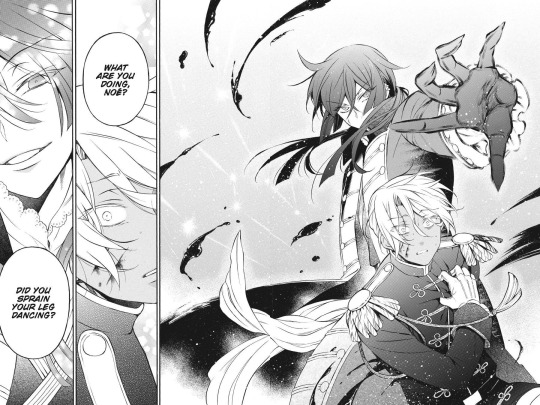
That's how Noé sees Vanitas. He is portrayed as radiant here, and the reason isn't just because he saved him from Naenia, but because Noé saw Vanitas saving several vampires using the Reverse operation, which gives him hope.
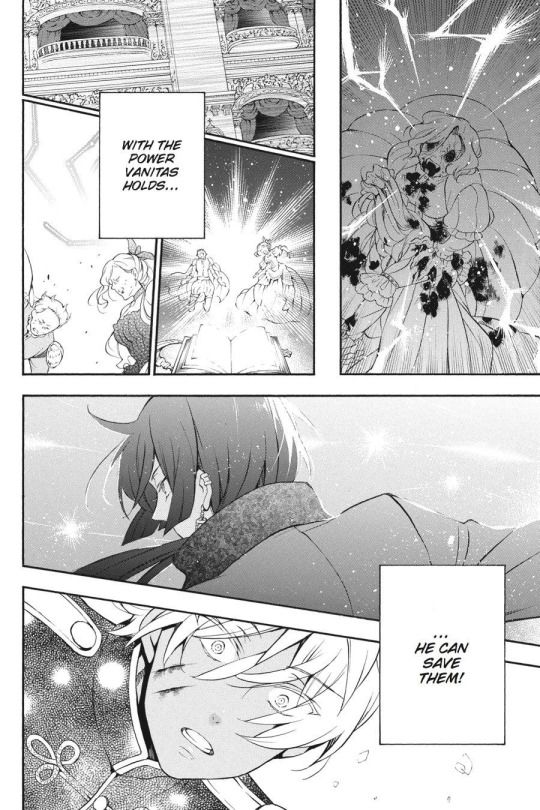
Vanitas is seen as a saving figure because it restored Noé's hope. After all, he experienced the loss of his childhood friend due to Curse bearer degeneration and this happen right after Naenia made him remember that.
However, when Vanitas fails to save Catherine and kills her instead, the portrayal/way Noé's view him changes
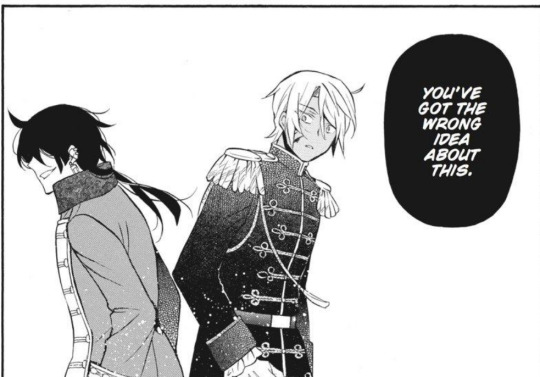
Vanitas's dialogue is in a dark bubble leading to understand the dialogue has a dark connotation which worries Noé creating a transition
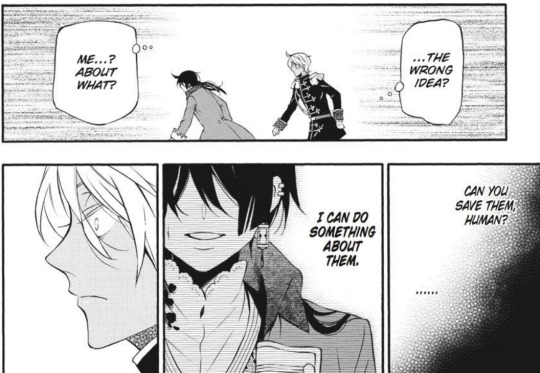
The panel where darkness seems to be growing and thus contrast with the light panel where Vani's hair shines brighter with the use of trame; replaced now by ink to signify darnkess as taken over, and here it's in Noé's vision.
When we are at the point where he will kill Catherine, Noé becomes more hesistant, the look on the panel showing his anxiety and then

He remembered the face Vani made when he claimed to save all the Vampires but with the dialogue he said a bit earlier, and while many commented on how threatning this face is, the fact that Noé remember this face right as Vanitas is about to kill Catherine says a lot on how he ended up viewing him very differently from the moment Vanitas saved him.
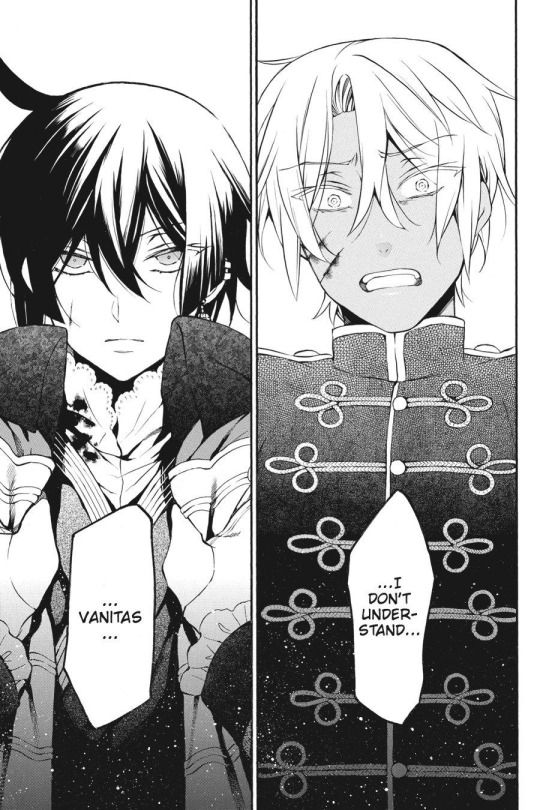

With this example, you can see that Noé's perception is limited to what he knows of the thing he see, modeling how he sees things.
By the time of chapter 52, Vanitas could have once again appears in his soft side, having saved Chloé and having Noé learn about his own insecurities. But in this chapter, Vanitas threaten to kill his childhood, friend, hence he doesn't view him anymore as the same and is unable to focus on him. An blatant example is how he failed to notice that Vanitas made this face when he tried to attack him.
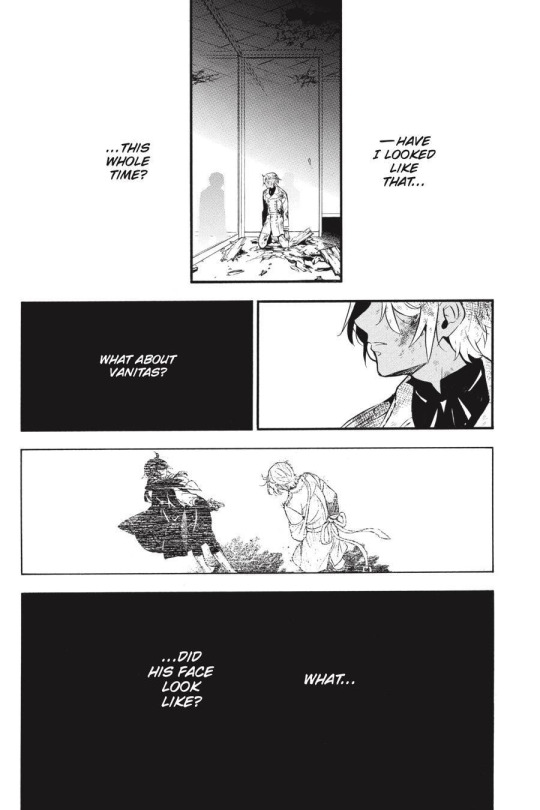
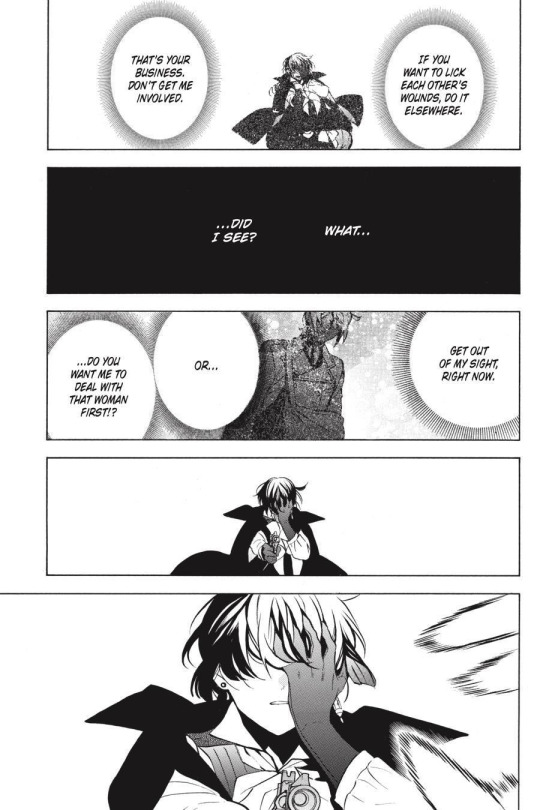
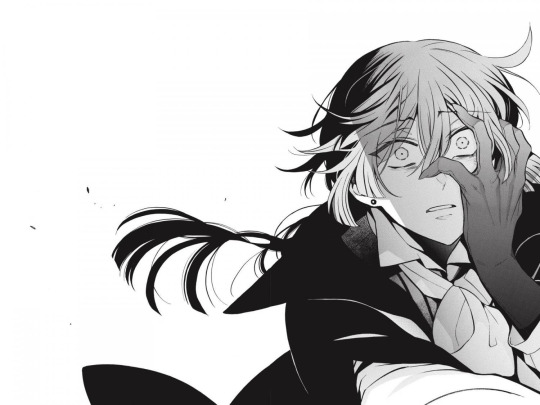
He will admits it himself, but it isn't before Jeanne, an objective watcher call hims out

That he snaps out. And even then he doesn't understand
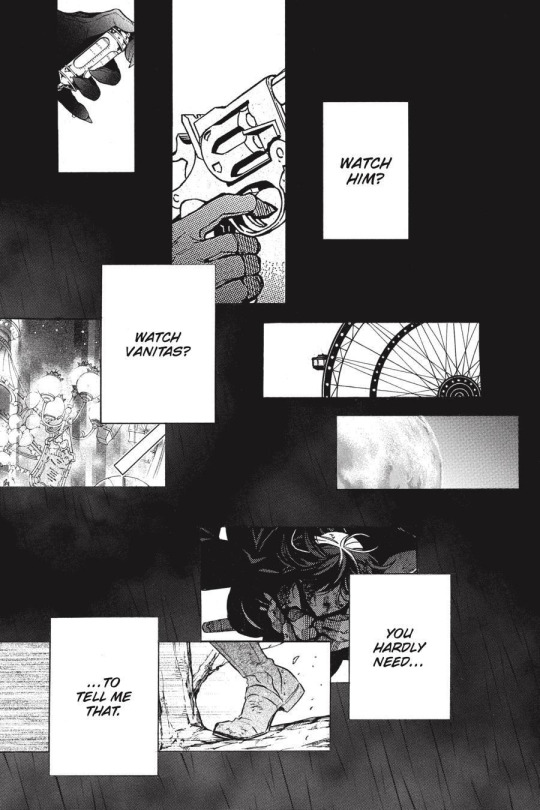
Until he sees himself in the mirror

The fact that Noé's vision of Vanitas is shaped by what Vanitas let him see of him, coupled by his blind self makes him an unreliable narrator, especially when it comes to what VNC is about : knowing who Vanitas is.
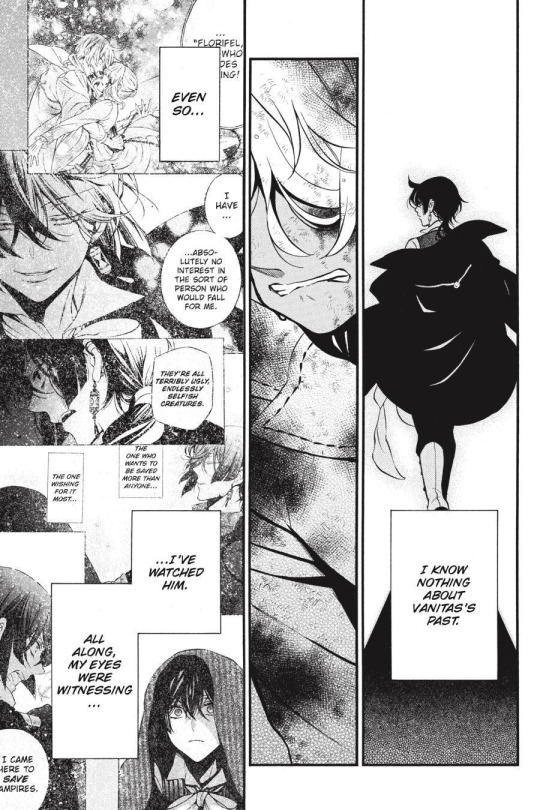
Hence, I think Noé's eyesight is actually refering to this element, that he is figuratively blind. At least for now.
But it should also be noted that Noé and Vanitas don't view the same thing in the same way as they have different knowledge of it and I think nothing illustrates it better then their duet song, Le Formidable where the chorus goes as such :
I walk into this
useless (Vanitas)
wonderous (Noé)
world
The chorus and some of the verse are constantly showing the dichotomy of how these two sees the world, contrasting between Noé optimism view and Vanitas's pessimistiv view, and the two untertwining creates a sense of discontinuity within the lyrics as the song keeps switching between their 2 POV which is complete polar opposite and this is more notable when the song comes to the chorus where both voices finally sings together and seems to have finally meet, but to show that while they live in the same world and lives the same adventures, they don't view things in the same way.
Now talking about Tirésias. He was a mythic poet that was cursed with blindness but the gods granted him in compensation the gift to see the future and he became a famous fortune teller. This is actually linked to an old, old belief about blindness. That although they can't see, the are gifted with a knowledge unabling them to see what is invisible to the common man. And while blind people often have sharpended sense, this is also linked to the old belief that the poet as prophetic talents.
So how does it link with Noé ?
Noé is actually an entity that is double : with have past Noé, the character and present Noé, the narrator/writer of the story. Past Noé is blind, but present Noé, while a potentially unreliable narrator is the one that knows how the story ends. After all, the end of chapter 1 sounds like a premonition.
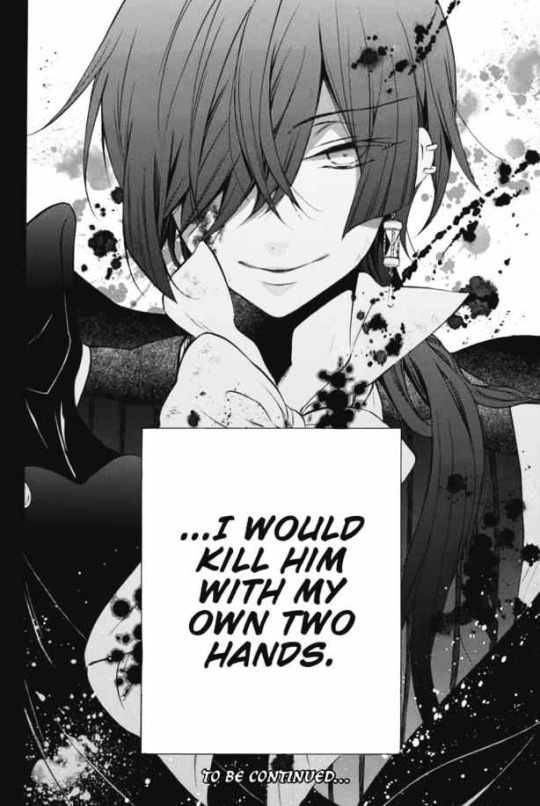
And that's because it already happen. Like for Oedipus that couldn't escape his fate, the story Noé is telling is bound to end like that because it's what the narrator already experienced. There is that critic Jean Paul Sartre made about true stories not existing arguing that the moment you tell a story when you know the ending of it, it cease be authentic because we don't know how things are supposed to end. And indeed, no one but God can know what will happen in the future. It is what is name the occult, ot "what is hidden"... what people used to believe blind people could see as compensation for their defective eyesight.
That add up to the fact Noé was shown to be literaly defective within his eyesight due to his injury. But canonically Noé has the power to know something that others vampire in particular can't. As an Archiviste, he can knows the past of someone by drinking their blood and looking into their memories, which got him to have a lot of people looking down on him for that has it's allowing him to look on what is intimate, etymologitically, what is deep inside of them, that which they occult. And in the case of Vanitas in particular, it's something that 1/ Vanitas don't want him to know 2/Noé admits in chapter 52 to not know.
However, as I mentionned the narrator knows the ending of the story, which contrast with how Noé is ignorant of the events of VNC compared to his future self narrating the story. And in chapter 56, there is finally a hint of him learning his irremediable fate
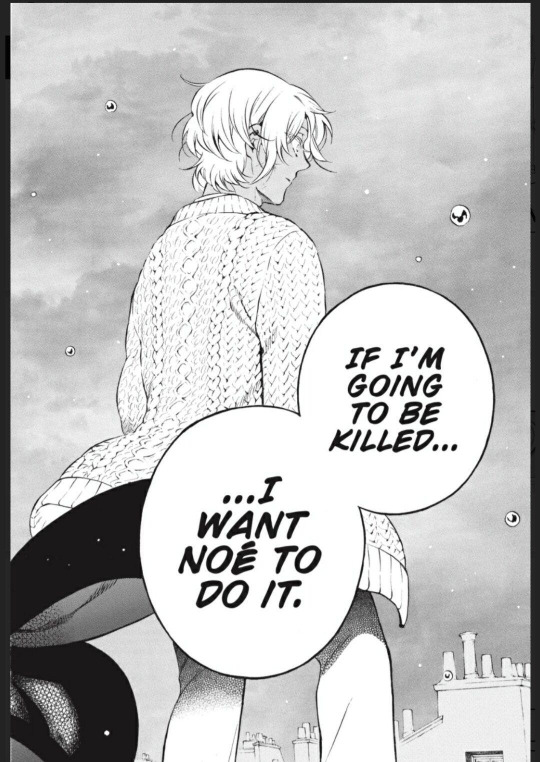
From the mouth of Vanitas, Noé learns what is future self already knew and told the audience.
This might be an indicator that Noé will manage to pass of his initial blindess as he tells the story and thus recover a proper eyesight, signifying be able to see things other then through a veil of ignorance/innocence/subjectivity.
And this can be seen as through VNC, there are clear instance of Vanitas moments focused when Noé was simply not here, and thus should not know about it, specially when Vanitas nevers tell him about it, such as his meeting with Jeanne at the ball, his discussion with her during the lunch Lucas invited them to partake, their meeting at the ball, their date in Paris or in the cabine.
There is also the fact that he relates his meeting with Ruthven in the meantime, when he should have forgotten about it. Or, the most obvious piece of evidence, the fact that he was able to convey how Vanitas felt when he attacked him even though the chapter made it clear Noé had no idea on how he looked like
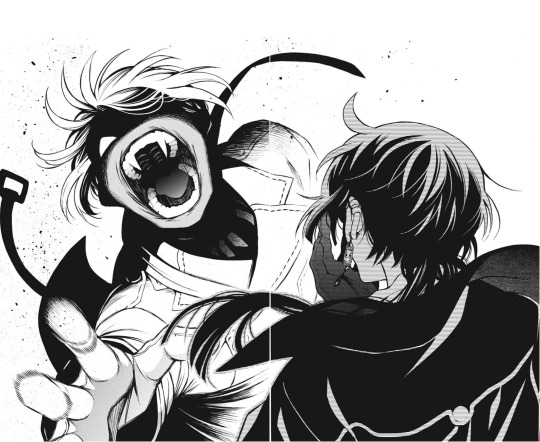
This for instance, shows that Noé/narrator was able to overcome his own biais and overcome the fact he would have remained an unreliable narrator had his vision not changed.
Long story short is that Noé/narrator knows and see what Noé/character doesn't know/see and shows us the ignorance he had at the time, while keeping in mind that Noé/character doesn't know while Noé/narrator is the one who knows everything. What is going to happen, how it is going to unfold.
Thus it is very important to remember that what Noé/character sees will constantly be challenged by what his future self saw and therefore knows.
And considering that VNC heavily deals with how Noé's vision of the world is constantly challenged throughout the story, I think it is possible that his character would evolve in such a way
#vanitas no carte#the case study of vanitas#vanitas no shuki#jun mochizuki#noé archiviste#meta analysis#manga analysis#greek mythology
98 notes
·
View notes
Text
Thoughts : Harrowhark Nonagesimus and Gideon Nav from TLT as a Hades and Persephone parallel.
I thought about this at exactly 4:30am and it’s 8am now, which means I haven’t yet figured out if it’s interesting or completely stupid, so bear with me. It’s probably bullshit but who knows.
Harrow as the god of the dead (but not of death) makes sense. Bones and shit. Also she’s the Reverent Daughter of the Ninth, and the Ninth is Pluto, and Pluto is Hades’ Roman equivalent.
Now : the equivalent of Persephone’s kidnapping by Hades is Gideon being forced to serve the Ninth and then being forcefully taken to the First House by Harrow. She makes it very clear she’d like to be anyway but there. (Also during her childhood she keeps daydreaming of her mother and saying her parents will come back to help her. Mh. I can’t see any parallels between Wake and Demeter, but John as Zeus makes sense.)
Then, there’s the fact that Gideon considers herself married to Harrow. Her last words to Harrow were wedding vows. (When she tells Camilla ‘Marry a moron and die. I get the urge.’)
When she is resurrected, she isn’t resurrected fully. Her body is still dead and Harrow ate a part of her soul : she is a new person. (Persephone ate the pomegranate seeds (a metaphor for marriage, the fruit being associated to Hera) and she goes back to the surface but will always be tied to the underworld and has to go back every year.) Her name is changed to reflect that, from Gideon to Kiriona (from Kore to Persephone).
Another thing : when she is resurrected she meets her dad, the guy she kept daydreaming would be very important and get her out of the Ninth. And he is important ! He’s God. He also doesn’t really help her at all since he is the one who only resurrect her partially, letting her body dead. (Zeus is the one who agreed to Persephone going in the underworld and still being tied to it.)
It’s very likely that my brain is just desperate to create more links between my hyperfixation and my special interest but I thought I’d share. I’m aware that Gideon doesn’t seem to ever have a period of innocence/happy childhood, unlike Kore.
#the locked tomb#tlt#tlt meta#tlt series#tlt analysis#greek mythology#greek gods#ntn#kiriona gaia#harrowhark nonagesimus#gideon nav
118 notes
·
View notes
Text
I’ve never had to play detective with myths - like I have with the locked tomb. I’ve just been sitting here cross referencing “the tower”, with the Bible, Greek mythology, Māori, Persian history, tarot and creation legends and dude. This is so fun. This is crazy.
Tamsyn Muir is making me research history with this new fantasy Sherlock Holmes angle and it’s so fun.
#the locked tomb#tlt meta#what the fuck#history#greek mythology#nona the ninth#the tower is reactivated
158 notes
·
View notes
Note
i’d be super curious to hear your thoughts of the characterisation of achilles in the iliad! because while he is considered honourable and respected by the standards of the culture, surely by modern day standards he wouldn’t be so much? which is why i think that MM did such a great job, because she basically modernised him so that we would see him in the same ways that the greeks did re: his nobility versus his arrogance, but i thought the general consensus on achilles is that he’s an ancient greek hero which equals Not A Good Guy by our standards (but my formal education in classics is limited, i mostly partake as a hobby, so i’m always looking to expand my understandings and opinions and you’re obviously a very intelligent and considered person)
So I think the most important thing anyone needs to do when engaging with ancient greek works (and indeed any sort of work, especially those created millennia ago) is to keep an open mind. Importing modern moral judgement is anachronistic when it comes to the Iliad; hubris, as we understand it now, simply does not exist in the Iliad, there are no Good Guys vs Bad Guys, there are no Heroes or Villains. Those notions came much later and are very much a Christian thing. A hero in the Homeric world has no moral implication; he is simply a warrior. A dude that does things, and not necessarily admirable things. So it would be pointless to try to view Achilles or Hector or Agamemnon (or even the gods in the Iliad who do some pretty fucked up shit) as good or bad guys, because such a thing is irrelevant in the Iliad.
That being said, I feel like Achilles is portrayed generally positively both in the Iliad and also in other ancient Greek works. He is noble, that is, he is of noble/divine lineage, he is well-spoken, well-educated, generally reasonable and polite with pretty much everyone, except for Agamemnon in that opening scene in the Iliad (who was a dick to him as well). He is also honourable and with a very rigid moral code: in the Iliad it is stated many times that he prefers to ransom back captives instead of kill them, and he even lets the body of one of the Trojans he slew be burned with his armour on as a sign of respect, even though it is a thing of great importance in the Iliad to claim the armour of the people one slew. He is not greedy and doesn't flaunt his wealth, he is generous with his Myrmidons and is generally rather well-liked. Until Patroclus is killed and he goes on his rampage, he is a pretty chill dude; and then after Hector is killed, he organises the funeral games for Patroclus where he is shown to be very diplomatic and reasonable, even with Agamemnon; and then when Priam goes to ask him for Hector's body back, Achilles treats him with respect and the two men bond over their grief. So like, idk about you but those don't seem like the actions of someone crazed or extremely arrogant or bad, even by modern standards.
I think what is most telling about how a character like Achilles was perceived in the culture that created him, is that his portrayal in later ancient greek works, mainly the theatrical and philosophical works of around the 5th cent BC, is generally positive. Some playwrights depicted him as a bit of a hothead or a little boisterous and full of himself, but that isn't really framed as a bad thing. Achilles in those works is a famous and powerful hero who knows how good he is and how much the army needs him, but he isn't needlessly flashy, he always keeps his word, he is brave and heroic even by modern standards: in Euripides' Iphigenia at Aulis, Achilles goes to great lengths to protect Clytemnestra and Iphigenia from the mob, and it is pointed out many times how averse he is to trickery and lies and that Chiron brought him up to be honourable, steadfast, to keep true to his values and to stay away from wickedness (which is what Agamemnon did, essentially). So I think it's really clear that for the ancient Greeks Achilles has many admirable traits.
You mentioned MM and how she modernised Achilles and made him sympathetic to a modern reader's eyes, and I simply don't think that's true. I think MM's portrayal of Achilles is pretty close both to the Iliad and how other ancient Greeks imagined him; perhaps the only way she differs is by portraying him a bit calmer in places lol. She simply took away all those layers of nonsense that had been piled on top of him through centuries of literary criticism that took all the later Roman works that depicted him as a sadistic monster a little too seriously or only focused on how awful he was compared to Noble Hector (no hate on Hector but those classicists really need to find a new blorbo *smh*)
I also think that maybe MM went a little too hard on the arrogance thing and on his obsession with glory without explaining it enough, but that's just my personal opinion. Achilles is very concerned with his glory in the Iliad as well, but we have to keep in mind his position here: Achilles gave up everything for that glory. He knew about the prophecy and knew that he would die in Troy, and made the choice to fight in the war because glory is just that important within the context of the Iliad. I think that many of the heroes we see in the Iliad would have chosen the same, if given a dilemma like that. So Achilles gave up the life he could have had, his kingdom, his family, just for his name to live on through the ages, and then Agamemnon royally fucked that up by disrespecting and insulting him publicly in the vilest of ways. Achilles then made up his mind to abstain from the war and to go back to Phthia and thus giving up his claim to glory because he was so over the war, and he probably would have done that had Patroclus not died. And then there was nothing else for him to do other than to die as well. So like.... idk. His actions make sense to me. He is a passionate character who is swept away by his emotions, he has flaws, he isn't perfect (if such a thing even exists) but I think he's all the more compelling for it.
I hope this answered your question, anon! Thank you for giving me the chance to ramble about my favourite fictional man <3
#achilles#the iliad#homer's iliad#greek mythology#patrochilles meta#not a big meta writer but if you poke me with a stick i might just write a small essay about it#or not so small ;w; sowwy
43 notes
·
View notes
Text
IWTV S2 Ep2 Musings - Claudia & Pegasus (Long Live the Queen 👸🏾😔)
The writing on this show is out of this world. On top of the immaculate cinematography. Like--who'd've thunk to put Claudia & Lou on top of that Pegasus statue overlooking the city? Gorgeous!
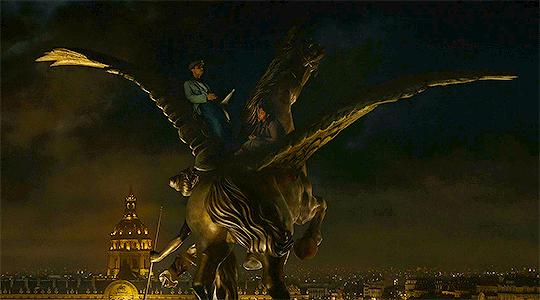
But also foreshadowing AF; reminding me of Bellerophon's doomed flight on Pegasus to reach Mt Olympus, home of the gods--

--after going to all that trouble learning to tame the flying horse--
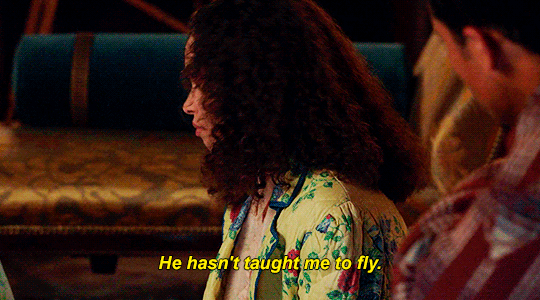
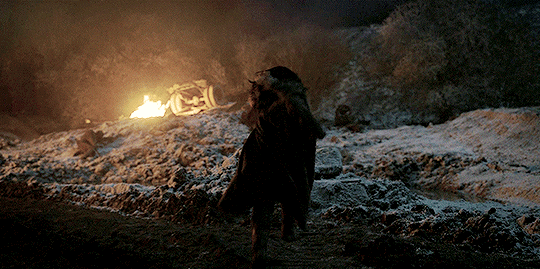

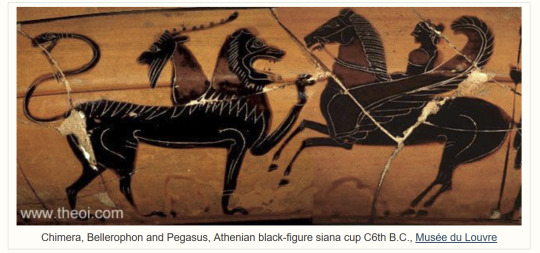
--after doing the impossible & slaying the lion-headed Chimera to reclaim his honor/birthright (Claudia de Lioncourt whomst?)
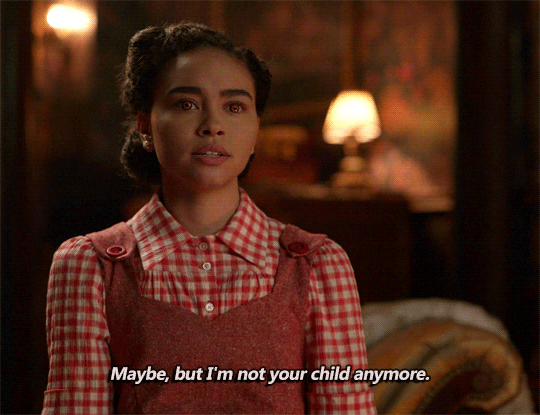
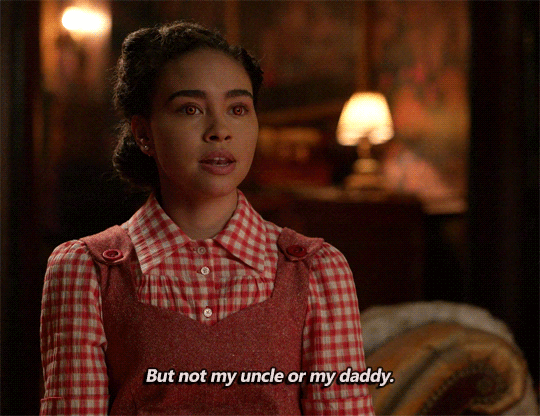
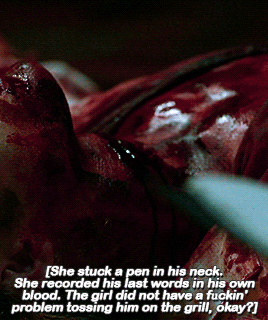
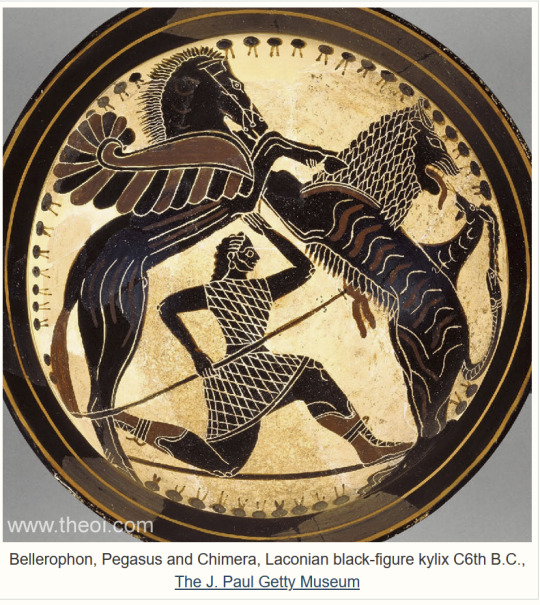
--only to be smote by the fiery lightning of Zeus for his hubris--
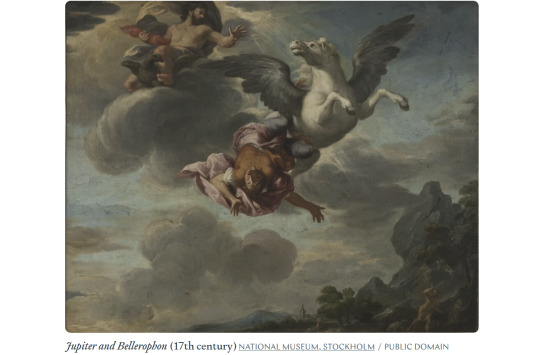

--thinking he was too smart & could get on the level of immortal gods

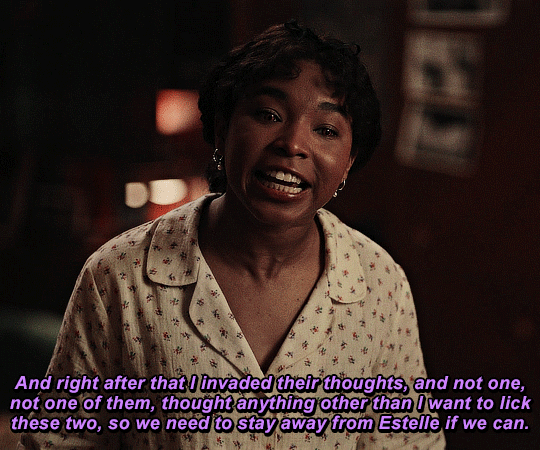
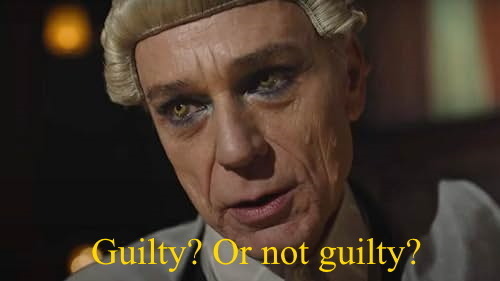

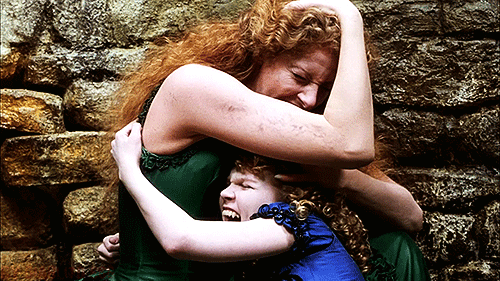
#iwtv season 2 spoilers#iwtv tvc metas#justice for claudia#interview with the vampire#greek mythology#must see tv#the hype is real
20 notes
·
View notes
Text
Flowers of Elarion

Here's my interpretation on Aaravos with some flowers of Elarion (in glow pens because it's fun). I based them off of hyacinths for several reasons:
1. Hyacinths are my favorite flowers
2. Hyacinths smell AMAZING, and Tales of Xadia states that flowers of Elarion "have a scent that can soothe the most ragged spirit":

3. In flower language, hyacinths can symbolize jealousy, desire for forgiveness, and sincerity, among other things:
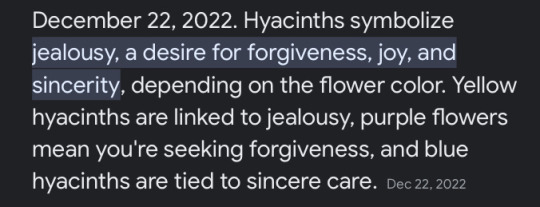
To me, this fits Lasair's story well. Leaving behind a flower as a gift as a way of asking for forgiveness for what they've stolen gives the gesture a bit more meaning. The sincerity/jealousy not only represents duality (a theme that is prevalent within the flowers of Elarion story) but also represents Lasair's feelings of jealousy for humans, who have enough to survive and don't need to steal, and the sincere desire for friendship and forgiveness.
I just think they're neat.
#aaravos#the dragon prince#my art#flowers of elarion#aaravos fanart#symbolism#duality theme#tdp theory#my theories#tdp meta#sort of#I love flower language#i could also go into Greek mythology and talk about how hyacinths symbolize rebirth and queer love#and how these themes link to the idea of Elarion and humanity#and especially link to the moon arcanum#but I digress#maybe one day I'll actually fully render this piece but for now this is it so#enjoy!
26 notes
·
View notes
Text
The fact that calypso's island is traditionally a place of peace and safety and love in the middle of the plot. A place for the characters to recuperate and heal and love. It's always framed as a paradise with everything someone could want. But her curse being that everyone she loves abandons her?!? Like yes it's bad communication on Ed and Stede's part, but also that's how it goes! Just the way it's both a place of healing and love, but also the catalyst for them to leave each other again as they try and figure out what they want. I am so excited to see what the next episode has in store, but the fact that we're just now transitioning into a third act?! God help us all
#ofmd season 2 spoilers#ofmd spoilers#ofmd#ofmd season 2#ofmd 2#our flag means death#stede bonnet#ofmd s2 spoilers#ofmd meta#ed teach#greek mythology#meta analysis#the oddyssey#calypso
59 notes
·
View notes
Text
The Ushers as Greek gods & goddesses
Inspired by Juno, the sweetest step-mother, being named "Juno", Roman counterpart for Hera, THE Evil Step-mother. Just as most of the characters don't completely fit one Seven Deadly Sins, some have gods combos. *SPOILERS*
Roderick (Zeus/Apollo)- Patriarch, a "king on high" as a CEO of huge influential company. Gifts his (often "bastard") progeny with power aka wealth, but he also can be hands-off, demanding, and cruel (mean ol' "sky daddy"). One of Zeus' favorite sons is Apollo and you can see aspects of Apollo, god of cities and the legal system, in younger Roderick: straight-laced and ambitious, but also had a poetic side to him (Apollo was credited with inventing the lyre). Apollo, of course, had an older twin sister, Artemis, whom he was close to.
Madeline (Artemis/Athena)- Madeline is the more "ungovernable" twin sister of Roderick; Artemis is the twin sister of Apollo who ruled in the wilderness. Madeline doesn't think much of most men apart from Roderick; Artemis had her male lovers and was close to her brother but she mostly ran with female posse of nymphs. However, Mad also reminds me of Athena, goddess of war strategy, and often the right-hand woman of father Zeus and the many male heroes she mentors into greatness; Mad is the more strategic of the twins and she was the power behind the throne. Worth noting that Athena was born springing out of Zeus' head, almost like the reverse of a twin absorbing their sibling in the womb.
Frederick (Apollo/Aries)- Frederick is the heir apparent, an offshoot of his father but not quite as good as his father. He gives big Apollo "son" energy even at middle age: juvenile in his slacking off of responsibilities (demolishing company buildings), Teacher's Pet attitude with his dad vs. being an ass to his siblings; his phobia of elevators earns him the childish nickname of "Sweaty Freddy". However, he's established to have been a good father to Lenore (at first); Aries is one of the few fathers in the Greek pantheon to give a fuck about his female children. However, Aries has a temper and is the god of war in it's most chaotic brutality (oppose to Athena's logical war strategy). After learning his wife was at an orgy, effectively cheating on him, Frederick spirals into an angry sadism, brutal and cruel.
Tamberlane (Hera/Athena)- Tam is an ambitious woman but a key part of her strategy of gaining power is through marriage: she picked out a man with the right sort of brand to help her pivot her inherited money & cache into the wellness business. She thinks herself more worthy of being Roderick's heir than Freddy, with her cooler head and logical planning (Aries vs. Athena). Hera is the goddess of marriage and so much of her mythos revolves around how her husband cheats on her and how she gets her control back by taking it out on the woman Zeus "seduces". In a twist, Tam controls her husband by making him cheat with women who look like herself (Hera btw is said to be vain; she's often symbolized with a peacock feather). Worth noting she especially of the siblings seems to hate Juno (Roderick's Hera; she calls Juno "it") but Juno tries to reach out to her the most (wife to wife?).
Victorine (Athena/Aphrodite)- Vic is a scientist, just as ambitious as Tammy, but she works closer with her father and is anxious to make him proud (might she wish to be Daddy's Little Girl and new right-hand woman?) I'm guessing Victorine has some legitimate STEM talent but Camille notes that the heart mesh was really the invention of Vic's wife, Al, and implies Vic seduced Al into a partnership, in the lab and in bed, to attain shared glory. Aphrodite, goddess of love, is charming to be sure, but self-centered: Vic willingly charmed a innocent woman into a surgery that likely would be fatal in pursuit of glory. She also commits a "crime of passion", killing her lover in a fit of rage. And her story centers around a heart (heart = love).
Napoleon (Hermes)- Hermes is the messenger god, always flying to-and-fro, light on his feet and a light-touch in life. He plays tricks on people but you can't stay mad at him, he's so charming (see the myth of him stealing from big bro Apollo right out the cradle). He's empathetic but ultimately flaky; Leo likewise is a fun, charming dude, bringer of drugs and Camille's key messenger of spin after Perry dies. He's close enough with some of his siblings to hang out with them, to offer them advice, and to mourn them when they are gone. But Leo is a cheater, inconstant to his boyfriend; he also often "flies" from reality by indulging of copious amounts of drugs, and tries to "fly" from the consequences of (allegedly) killing Pluto.
Camille (Aphrodite)- Aphrodite, along with what was said above, is beautiful, big on pleasure, and jealous, oh so jealous. Camille puts care into her appearance (that hair ain't natural), and is quite sexual, hiring her assistants to pull double-duty to service her in the bedroom as well as the office. She's also creative in her PR work, and Aphrodite loves the act of creation (or procreation, if you get me). But Camille is very jealous, mostly of Victorine. Camille can't help but be her brash self but, perhaps because her sister has that Athena side to her, Vic easily hides the same selfishness and callous nature they share, and Cam finds that infuriating.
Prospero (Dionysus)- Dionysus is the god of wine and a rip-roaring good time (pun intended). Dionysus was said to inspired hedonist frenzy in his followers and Perry wanted to do exactly the same to the patrons of his clubs (to blackmail them later). Also, Dionysus is a "newer" god compared to his siblings and Perry is the youngest.
Lenore (Persephone)- the "lightest" member of the Usher clan, Lenore embodies the sweet nature of springtime goddess of Persephone; she loves her mother fiercely as Persephone loved Demeter, but in a twist, it is the daughter who rails against and defies the gods (Frederick) to save her mother. In the end, Lenore goes to the Underworld, but just as Persephone becomes a powerful Queen there, Lenore's memory ultimately changes millions of lives.
#the fall of the house of usher#fall of the house of usher#tfothou#mike flanagan#greek mythology#meta#flanaverse#netflix#the fall of the house of usher netflix
64 notes
·
View notes
Text
atlas paralleling aziraphale and icarus paralleling crowley. aziraphale who had to carry heaven's weight on his shoulder, never daring to move in fear of it collapsing on top of him, only to be tricked into taking the weight again after he finally gave it away. crowley Fell from grace because of his curiosity, because of his greed, he flew too close to the sun after being trapped his entire life and "ended" his life because of that. aziraphale made crowley feel lighter than he had in years when he talked to him in eden and crowley couldn't see the consequences this simple action could have because he was just happy to talk to someone without fear. it made him feel like he was flying again. he just wanted to free aziraphale of his burden, of carrying the weight of guilt and sense of duty that came with heaven. the contrast between crowley Falling brutally (sauntering vaguely downwards) and feeling like he's floating bc of aziraphale. he feels free with aziraphale around, he values freedom SO MUCH and with aziraphale, he has that. aziraphale on the other hand can never really let go of what he's carrying, he can never be fully crowley's while still shouldering heaven's burden. aziraphale is crowley's whole universe, like the one they created together. aziraphale carried the sky and aziraphale is crowley's sky. crowley would do anything for aziraphale not to be burdened, even have him drop the "sky". he would have them leave it all behind if it meant aziraphale was finally free of heaven. he doesn't think about fixing heaven because it genuinely doesn't matter to him, he left it behind long ago, he literally fell away, while aziraphale is still so connected with it all, he's still stuck beneath the weight he is holding up on his own. crowley just wants to be aziraphale's, no matter the consequences and more than anything, aziraphale just wants him safe. it's why he's doing it all, he just wants crowley to be finally safe somewhere, even if it means taking up the heaviest burden of all again. anyway.
#yes i've been listening to i carrion (icarian) on repeat again what about it#im losing my mind they're so atlas and icarus it's making me go crazy how dare andrew compare him and his lover to them HOW DARE HE#'if these heights should bring my fall let me be your own' yeah. YEAH.#good omens#good omens s2#azicrow#crowley#aziraphale#aziracrow#ineffable spouses#good omens meta#greek mythology
64 notes
·
View notes
Text
locked tomb morning thoughts : something about John being born from Alecto (born on Earth + his powers come from her) and being immortal and somehow controlling time at least a little bit, and, in Greek mythology, Cronos (Titan, son of Gaïa) being associated with Chronos (Titan of time) and eating his children because one of his kids would become more powerful than him and overthrow him…. John told Kiriona she could become his cavalier…. idk. maybe it’s just my brain trying to create more links between my hyperfixation (TLT) and my special interest (ancient greek religion)
#the locked tomb#tlt#tlt meta#tlt series#tlt theories#tlt analysis#alecto tlt#john gaius#kiriona gaia#greek mythology#ancient greek religion
55 notes
·
View notes